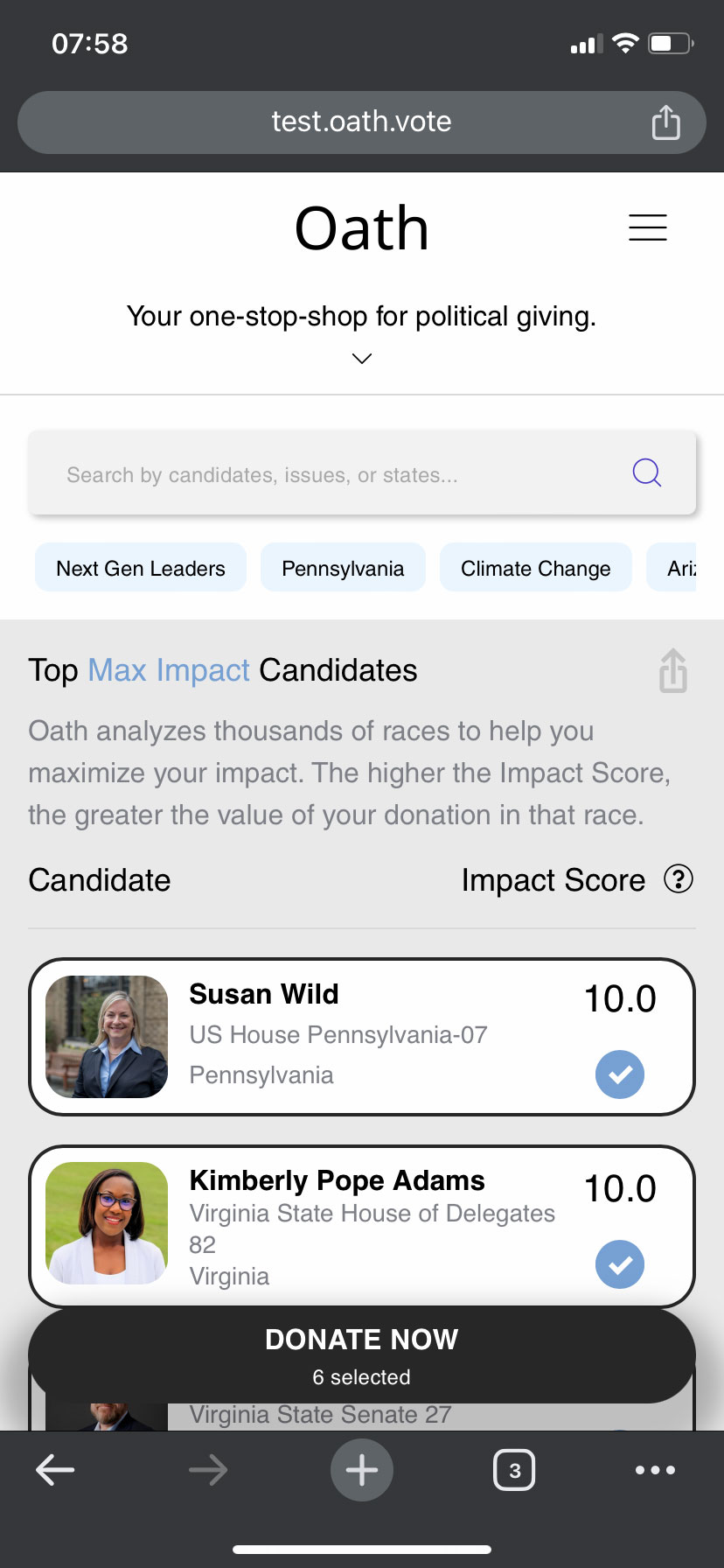As a fundraiser for Democratic members of Congress, Brian Derrick worked with highly-paid donor advisers who helped wealthy people decide where their dollars would make the most difference.
Now, the former campaign operative and social media star is working to build out Oath, a small venture-backed online giving platform that offers grassroots donors the same opportunity. The platform bills itself as a way for donors to “maximize their impact” by funneling their money to races that truly matter.
Oath soft-launched last year, distributing $2 million to candidates from some 10,000 donors, according to Derrick. Since then, Derrick says, he and co-founder Taylor Ourada have left their day jobs to dedicate themselves to scaling the operation. The platform aims to direct $30 million to candidates by the end of 2024, he says.
The problem Oath aims to solve is a real one: the tendency of the party’s grassroots donors to “rage-donate into the abyss,” as Derrick puts it. Democratic candidates who run long-shot challenges against the party’s favorite villains tend to suck up huge amounts of cash.
Read More: The Democrats Begging Their Party To Ditch the Activist Left.
Take Marcus Flowers, who last year ran against Rep. Marjorie Taylor Greene in Georgia. Flowers’ campaign to unseat one of the left’s biggest bogeymen in a deep-red district raised more than $10 million dollars—and he lost by more than 30 points. Derrick mentions Amy McGrath, who challenged Senate Republican leader Mitch McConnell in Kentucky, and Jaime Harrison, who ran against Sen. Lindsey Graham in South Carolina, both of whom raised tens of millions for their 2020 Senate bids only to lose by double digits. “I’m not saying that no money should be spent there,” Derrick says. “But there should be a brake pedal. ”
Oath’s solution is to assign “impact scores” to candidates as a way to indicate to donors where their money can be put to best use. The platform says it calculates the scores based on three main metrics: competitiveness, stakes, and financial need. “Competitiveness” is determined by the partisan fundamentals of a race, as well as public or private election forecasting. The “stakes” score encompasses factors like whether a particular seat could flip a chamber, or whether a strong performance could help improve the fortunes of other candidates. “Financial need” examines how much cash a candidate has, how much their opponent has raised, outside spending, and the typical cost of running for a specific office in a given media market.
While there’s subjectivity involved, Derrick says the metrics are designed to be instructive to grassroots donors, many of whom are besieged with spammy solicitations based on misleading push polls or dubious promises to match their donations. Derrick says the platform hopes to analyze thousands of races in 2024, from House and Senate campaigns to state legislative and school board candidates. Oath currently rates just under a thousand Democratic, Independent, and nonpartisan candidates, including all the ones running for the Senate or House that aren’t in a competitive primary. (For now, Oath is steering clear of those.)
Read More: Why Dean Phillips Is Challenging Biden.
Candidates cannot pay to be included or to boost their ratings, according to Derrick.
“We think that’s important, both for optics, and just for true transparency and objectivity in the recommendations that we make,” he says. Oath doesn’t take a cut of donations, either, instead relying on initial funding from its largest funder, the progressive start-up accelerator and venture fund Higher Ground Labs, as well as individual donations from friends, family, and advisers, plus voluntary “tips,” with which Derrick soon hopes to cover all operating expenses. It charges a 2.99% credit-card processing fee, which Derrick says is among the lowest in the political-giving industry. (The processing fee for ActBlue, a leading Democratic fundraising portal, is 3.95%, according to its website).
Oath does not discourage giving to candidates with lower “impact” scores. “Maybe you just met this person at the grocery store, maybe you have a personal relationship, maybe you just like their messaging and you want to support them, or they just came out on a specific issue and you want to send some financial support,” Derrick says. “But if you’re looking to maximize the impact of your dollars, we can instead recommend some other races.”
While the startup remains little known in the party’s fundraising firmament, some strategists welcome the arrival of a platform that could boost the visibility of critical down-ticket contests.
“The more money going to down ballot-races, the better,” says a national Democratic operative. “We welcome any giving platform that helps our candidates raise money and win.”
Denial of responsibility! My Droll is an automatic aggregator of Global media. In each content, the hyperlink to the primary source is specified. All trademarks belong to their rightful owners, and all materials to their authors. For any complaint, please reach us at – [email protected]. We will take necessary action within 24 hours.


